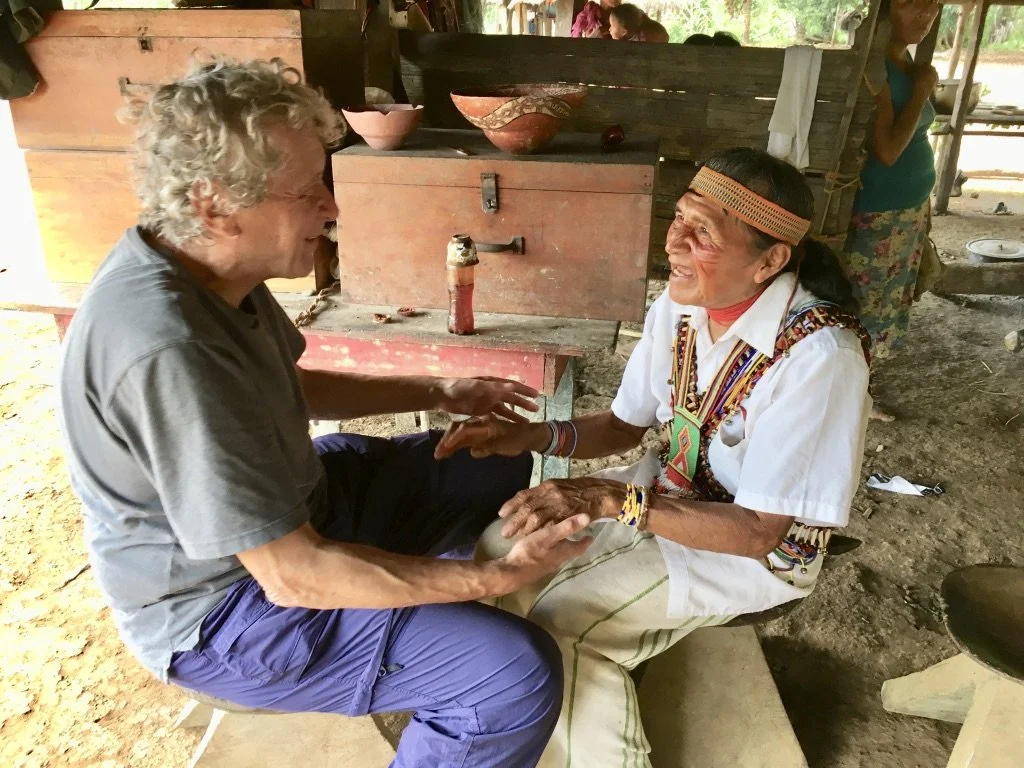What Indigenous People Teach Us
When the Peace Corps sent me to the Amazon rainforest in 1968, I dove into research on the Shuar, the community I would soon call home. All the information I could find considered them to be among the most impoverished people on the planet. My job was to form credit and savings cooperatives – to bring these people out of extreme poverty.
When I arrived in Shuar territory, I discovered that the Shuar were the opposite of impoverished. They wore clothes and lived in homes that were extremely well adapted to the climate— very different from what I was accustomed to in my own life. They enjoyed a wide variety of fruits and edible plants. They drank a type of home-brewed beer that had just enough alcohol in it to kill the parasites in the river waters. The men went hunting and fishing early in the morning and came back within several hours. The women tended their gardens during that same time. Then, the adults and children spent the rest of the day playing, swimming, and casually making baskets, blowgun darts, clothing, and other items essential to their lives. In the evening, they sat around the fire telling stories and teaching the children about traditions and legends that often went back centuries, if not millennia.
In short, these people were impoverished only when measured by our economic standards – ones that classified them based on their lack of dollars or other currency.
My job was impossible. The Shuar dealt solely in perishable goods. You can’t save bananas, papayas, or fresh fish. I had nothing to offer these people. But they had a great deal to teach me. When I left the Peace Corps, I became chief economist at a consulting firm and had the opportunity to study with Indigenous people and their shamans in Africa, Asia, the Middle East, Latin America, and North America. During those years, I discovered that many Indigenous cultures possessed something very important that my culture lacked: a wisdom that has a profound respect for nature, a belief that people are a part of – rather than apart from – our environment, and a dedication to practices that create a sustainable world for coming generations.
I was a maverick in the 1980s when I began writing books about the importance of gaining such wisdom and learning sustainable practices from Indigenous cultures. However, today people all over the world have come to look at Indigenous peoples as models for good stewardship. There is a growing recognition that we must transform a degenerative Death Economy that is consuming and polluting itself toward self-destruction into a regenerative Life Economy that is sustainable, circular, and creates an Ecological Civilization.
My upcoming webinar, Indigenous Wisdom and Proven Practices that Will Change Your Life and Create an Ecological Civilization, will delve into the mindsets and practices that will promote this transition. Although “it takes a village” to make this happen, each of us has an important role to play. We can create for ourselves the life we most want and do it in ways that help turn the Death Economy into a Life Economy.
I invite you to join Indigenous Wisdom and Proven Practices that Will Change Your Life and Create an Ecological Civilization and be inspired to overcome blockages that have held you back, move forward into the life you most desire, and participate in molding a new future for all of us. You will join a community of very special people, united by the belief that our presence in this era is no accident— and that each of us has a crucial role to play in the evolution of humanity.
The world needs you. . .
For details about this five-session webinar and upcoming trips to the Achuar of the Amazon and Maya of Central America, click here.
